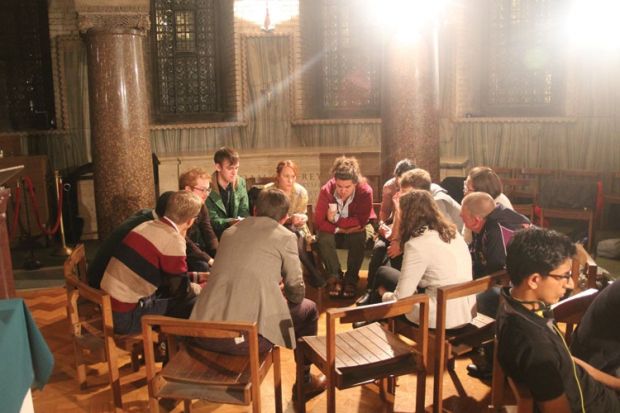Guerrillas in their midst: academia’s equivalent of the flash mob
An academic at the London School of Economics has pioneered a form of “guerrilla lecture” he describes as “the most interesting thing I have done in 30 years as a teacher”.
The rumours started on Twitter with a mysterious exchange on the subject between Conor Gearty, professor of human rights law, and the LSE’s director, Craig Calhoun.
By last week, news had migrated to the LSE website under the heading “What the Hell?: Forget traditional lecture halls and think, instead, an intellectual form of a flash mob…Meet us in the foyer of the New Academic Building this Thursday 24 October at 6.45pm for more details about this secret assignment…PS: Bring your bus pass.”
Although there were places for only 40 people, queues of undergraduates, postgraduates and non-academic LSE staff began forming an hour in advance. When the time came, those at the front were told to meet in a courtyard by Westminster Cathedral. From there they were led to an obscure doorway opening on to the crypt.
It was at this point that Professor Gearty appeared with three colleagues – Eileen Barker, an expert on cults; Matthew Engelke, who writes on religious movements and humanism; and LSE chaplain James Walters – and announced that the theme of the evening would be “Hell”.
The group split into three, with the academic experts leading discussions on three questions: “What is the worst thing about Hell?”, “Why is the idea of Hell so enduring?” and “Where has Hell gone?”. Then they all came back together for a more general debate.
“What emerged”, reported Professor Gearty, “was an interplay of background, personality and intellect, all wrestling with questions personal and philosophical thrown up by others in the group.
“It was designed to encourage thinking in ways they were not used to, with traditional expertise interacting with enthusiastic intelligent students to produce deeper understanding. The participants said afterwards that it was marvellous not to know the theme in advance because they wouldn’t have come to something on religion.”
The success of his first “guerrilla lecture” has left Professor Gearty keen to repeat the experiment every few months.
“I hope to leave students with memories of their time at university outside their main syllabus,” he said, “through something that is a real event – hence the travel, hence the venue, hence the topic. I believe students would be up for more adventurous forms of lecturing. They experience a lot of things like that in the rest of their life, so why not at university?”
Register to continue
Why register?
- Registration is free and only takes a moment
- Once registered, you can read 3 articles a month
- Sign up for our newsletter
Subscribe
Or subscribe for unlimited access to:
- Unlimited access to news, views, insights & reviews
- Digital editions
- Digital access to THE’s university and college rankings analysis
Already registered or a current subscriber? Login




